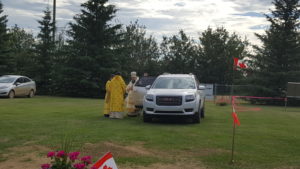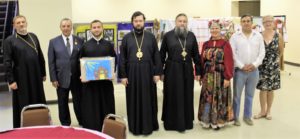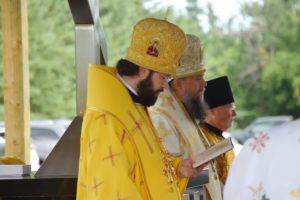Interview with Vladyka Iov on the occasion of the 120-th anniversary of the Orthodoxy in Canada
1. The festive events dedicated to the 120th anniversary of Orthodoxy in Canada are over. Bishop Antony’s visit to Canada is completed also. In your opinion, Vladyka, did everything pass as planned? Did you manage to prepare everything on time?
– For a long time the clergy and members of the Parish Councils together with me thought about how to celebrate this date – whether to invite a delegation from the Patriarchate, whether we can adequately accept it? And now, with the help of God, festive events and visits to parishes (from the west of Canada and ending with its eastern provinces) were successfully accomplished.
It is very symbolic that, having begun his visit by visiting those parishes that were founded in Alberta with the blessing of St. Tikhon (Bellavin), Bishop Anthony completed the trip to Canada by the Liturgy in the Patriarchal Metochion in Toronto – in the temple dedicated to Saint Tikhon – this great Preacher and the Confessor of Orthodoxy. It turns out that the Heavenly patron and the spiritual father of Orthodoxy in Canada accompanied us with Vladyka Anthony, starting from the first day – when we met at the airport of the city of Edmonton – and until the last moment when we left each other at the airport of Toronto on the way back to the places of our ministry.
Just before the arrival of the delegation from the Patriarchate, I, having opened the “Biblical Symphony” of the Holy Scripture, tried to learn about the symbolic significance of the 120th anniversary of the Bible. The number 120 is significant and is mentioned several times in the Holy Scripture.
The first time in the Book of Genesis, where God, seeing the great corruption of people, said: “My Spirit shall not strive with man forever, for he is indeed flesh; yet his days shall be one hundred and twenty years.” (Gen. 6:1-7). According to many commentators of the Bible, 120 years is the time given to people for repentance before the onset of the Flood at the time of Noah. Probably, as many years Noah built his Ark – the prototype of the future Christ’s Church.
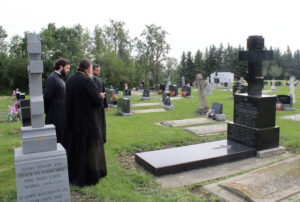
A brief funeral prayer at the burial of Archbishop Panteleimon at the cemetery of the parish at Nisku
Exactly the same 120 years of live were for the great prophet of God Moses, who led his people out of slavery and died on the border with the Promised Land, “Moses was one hundred and twenty years old when he died. His eyes were not dim nor his natural vigor diminished.” (Deut. 34:7). According to the instruction of the church historian of the 4th century Eusebius, St. James, the brother of God and the first Jerusalem bishop lived for 120 years also and suffered as a martyr.
I do not know how to accurately interpret these biblical testimonies for us and for our date, but in any case, one thing is clear – 120 years is an important historian milestone, a border sign of the onset of something new and, often, something better. Certainly, this is a main “rehearsal” of our capabilities and an important stage of preparation for the 125th anniversary of Orthodoxy in Canada.
As for the festivities, then, in view of our modest powers and capabilities, we humbly did not plan much. The main thing in the celebration for us was the service of the Divine Liturgy at the historic site where it was first performed in Canada. That first Liturgy, with the blessing of St. Tikhon, the future Patriarch, became the spiritual foundation of Orthodoxy in Canada and we wanted that the present celebration and Bishop Anthony’s visit would become the spiritual reinforcement of the entire building of the Patriarchal parishes for the next 100-120 years.
In addition, Vladyka Anthony, as the new Head of the Directorate for Institutions Abroad of the Russian Orthodox Church, requested that he would be introduced to the life, characteristics and state of the maximum number of our parishes on the spot. In connection with this, we visited our St. Tikhon Children’s Camp at Pigeon Lake, churches in Torsby, Calmar, Mundare, Chipman, Skaro, and of course the Holy Trinity Church of Old Wostok. Divine services were also held in the Cathedral of St. Barbara and the Church of the Nativity of the Blessed Virgin in Nisku. Everywhere Bishop Anthony devoted much time to speak with the clergy and parishioners, who shared with him their joys and problems, told about the history of their churches.
I think that the visit of such a young and talented Prelate, as Bishop Anthony, poured the spiritual “oil” into the “scanty old lamps” of the church life of our parishes – and now they will shine brightly for many, many more years.
With gratitude I should also note the participation in the church events of the Embassy of Russia in Canada and personally Ambassador Extraordinary and Plenipotentiary of Russia to Canada Alexander N. Darchiev. He came from Ottawa to Edmonton to personally participate in the celebration of the 120th anniversary of Orthodoxy in Canada, at the historic site of the first Liturgy. For most of the participants, his arrival was a pleasant surprise and gave joy, becoming a new link in the spiritual tradition that has been going on since Tsarist Russia, when the Russian Government – through the Holy Synod – rendered multifaceted assistance to the newly discovered parishes of the financially needy Rusyns in Canada.
2. Vladyka Anthony is the Head of the Directorate for Institutions Abroad of the Russian Orthodox Church. According to his activity, he has to visit different countries and see the life of different parishes (ROC is present in more than 60 countries of the world, the total number of parishes is over 1000). What features of the Orthodox Church in Canada did the Bishop mention? Do you agree with him?
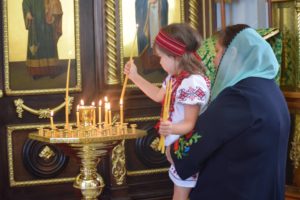
“Suffer the little children to come unto Me, and forbid them not, for of such is the Kingdom of God…” Cathedral of the Great Martyr Barbara, Edmonton
– Yes, it so happened that from the very first years of its life the Orthodox Church – first in different parts of the Roman Empire, and later in various countries of the modern world – had and has a peculiar and very special national coloring, a kind of a “national cloths”. The life of the diocese of the Orthodox Church of Alaska neighboring us differs from the life of the ancient Eastern Patriarchates of the Mediterranean, or Australia, where, for example, in connection with the geographical situation, Christmas and Epiphany falls on the summer season. National traditions of a certain area have always been given to the church ceremonies its unique cultural color (decoration of the temple, icon painting style, etc.).
Vladyka Anthony, answering the question about the peculiarities of the Canadian parishes, compared them with the parish communities in Italy, which he ruled for five years, noting that the situation in our the parishes is much better. New parishioners come to Canada to stay here for a long time and the parish temple immediately becomes their own. In Italy, where the level of live is lower, they are only a temporary employees, whose home church is not in Italy, but in Western Ukraine or in Moldova. It is clear that they support the Orthodox churches at a minimum, continuing to take care of their churches in their homeland. Here, in Canada, the situation is different – for all parishioners the temple is a home.
3. You have been leading the Patriarchal Parishes in Canada for 12 years. What changes have taken place over these years? Are there any problems that you drew the attention of Bishop Anthony?
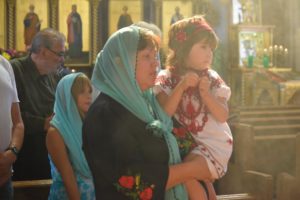
“Suffer the little children to come unto Me…” (Mark 10,14). Cathedral of the Great Martyr Barbara, Edmonton
– There was a change of generations of parishioners from the old emigration. Its best representatives went to another world. At the same time, the number of newcomers increased. When I arrived to Canada, 80% of the worshipers in our cathedral were English-speaking people, and they were coming to the Holy Chalice only once a year – during the Great Lent (usually on Lazarus Saturday). On Sundays there were about 10 communicants – mostly children of newly arrived families. Now there are 80% of Russian speakers and more than 50 communicants every Sunday. And our most important treasure is the numerous children and babies of our new parishioners. There are about 30 of them on each service. During the first part of the divine service – “The Liturgy of catechumens” – the Sunday School is functioning in the cathedral, where parents study the “Law of God” with their children. We have not only Russian speakers who have emigrated from different parts of Russia, Belarus and Ukraine, but also a friendly community of Orthodox Georgians. The composition of the festive choir of the cathedral, the remarkable singing of which was noted with praise by Bishop Anthony, was renewed over the years by an average of 70% and at the same time, thanks to the new young leaders, the quality of the prayerful performance of liturgical chants increased.
With the miraculous help of God and with the help of the new arrivals, we also managed to “resurrect” one of our “dead” farm parishes in the neighboring province of Sacketchewan.
I should also note the gradual rapprochement and sincere friendship of our clergy and clergy of the diocese of the Russian Church Abroad in Alberta and other central provinces.
Problems we have, probably, are the same as everywhere else. Secularization, the influence of Protestantism on the parish and spiritual life, the difficulties in the families of parishioners with the churching of the younger generation. I believe that it is possible to solve them only through our personal example, the holiness of our life, firmness in faith, sincere prayer and, of course, with God’s help.
4. The majority of the Patriarchal parishes in Alberta and Saskatchewan are farm parishes whose parishioners are elderly Canadians, descendants of immigrants from Western Ukraine, Galicia and Bukovina. The fact that these people managed to preserve Orthodoxy in Canada is amazing and admirable! What helped and still helps them not to “dilute” among other Canadians, but to preserve their identity, firmness to the faith and culture of their ancestors?
– Yes, their firmness in faith and the desire to preserve traditions, temples, to support the clergy cause admiration and heartfelt gratitude. First of all, they retained their culture and faith through the succession of generations, living in farmlands, and even, to some extent, the absence in those days … of the Internet! (smiles) For many of the old parishioners, their parents along with their grandfathers and grandmothers became “apostles”, for whom God and the Orthodoxy were above all. At their homes, they created and supported “home church”, preserving the culture and the spirit that they brought from the “Old Country” – the western regions of our country (Russian Empire)! First and foremost, the Orthodox Church with its divine services and holidays helped to save the faith of the ancestors and their cultural heritage! Family relations with relatives in Canada and with those who stayed at homeland also strengthened faith of our immigrants and for a long time helped them not to forget a mother language. It is interesting, that the first generation of newly arrived parishioners called Canada with love and tenderness – “The Canadian Rus”, and even issued a church-and-public newspaper with this name – first in Edmonton and then in Winnipeg.
5. At he same time, the parishioners of our farm parishes are almost all grandparents already. There are almost no their children and grandchildren in the church. Do these old farm temples have a future or will they become only architectural monuments?
In the consecration of the temple, we pray to the Lord that He will keep the sanctified temple until “the end of the age”. The task of the clergy is to preserve such temples until better times. We have almost all our churches restored and well-conditioned for at least the next 50 years. Then and there – Lord willing! It is not excluded that in the future these churches can be filled with Chinese neophytes (smiling) or with former city dwellers running off urban problems to eco-places.
We also have an option of moving some of the temples to local museums in order to be preserved. But at the same time they will remain “living” temples: several times a year on special days, divine services will be held. Examples of this already exist, and not only in the Ukrainian Cultural Heritage Village. And such temples continue to be not only the architectural monuments, but also indefatigable preachers of the Christian faith, witnessing the piousness of their builders.
6. What difficulties you, as a bishop, have to face here in Canada? And vice versa, is there something here that pleasantly surprises?
– Huge territories do not allow me to visit many parishes frequently … Flights on airplanes take up a lot of time and strength. Long distance between our parishes and the center of our Church creates a certain isolation.
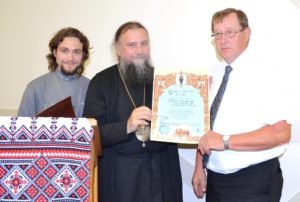
Bishop Iov has awarded President of Orthodox V parishes Yakim Lopushinsky with a certificate of merit. Fr Alex Suraev
I have to note the sad division of Russian Orthodoxy and Orthodoxy in general (which in North America, prior to the revolution of 1917, was unified, as part of one diocese with several vicarities) into various jurisdictions. For example, some modern Russian parishes are historically under the American Orthodox Church jurisdiction, which is the main successor to the Valaam mission in Alaska. Thank God, we do not have any conflicts with anyone. Our demarcation has already settled and a vast “field” for the spiritual labors of the clergy of all canonical jurisdictions is more than enough here. Also, in some places we are adjacent to the temples of the Russian Orthodox Church Outside of Russia. A newcomer often finds it difficult to understand the subtleties of the Orthodox history in Canada. The “Tomos” of 1970, granting Autocephaly to the Orthodox Church in America, limits our ability to open new parishes… Nevertheless, together with the Diocese of the Russian Orthodox Church Outside of Russia, we managed to open several new Russian parishes under the omophoros of Archbishop Gabriel. In addition, unfortunately, non-canonical communities also exist in Canada, even here in Alberta: for example, St. Vladimir’s church in Edmonton; the women’s Monastery of the Holy Protection in Bluffton (now related to some schismatic Greeks, the Old Calendarists). To our common great joy, this year we celebrated the 10th anniversary of the restoration of the Canonical and Eucharistic communion between us and the ROCOR: this restoration has made our Russian Church spiritually united and much stronger. However, there is still a lot of work to be done to establish complete unanimity and mutual understanding.
The nationalism that is propagated by some representatives of the Ukrainian ethnic part of the Canadian population also creates problems in the church life of numerous canonical jurisdictions in Canada as well as in my homeland – Ukraine.
We are happy to see that the small number of members in the majority of farmer parishes, which disturbs our clergy, on the other hand contributes to spiritual fellowship in the priest and parishioners communication, and the establishment of fraternal relations between them. However, the old age of some parishioners also has its own specifics: they treat a young priest not as their shepherd, but as their child, that makes it almost impossible for them to discuss the spiritual side of their lives or painful needs.
7. At a solemn dinner after the Divine Liturgy at Wostok, it was mentioned that His Grace Bishop Anthony received a Canadian visa for next 6-years. Did he express a desire to return to our country?
Yes, Vladyka liked Canada and he agreed to come to us even every year, if there is a necessity and a blessing of His Holiness Kirill, Patriarch of Moscow and All Rus. It should be noted that His Holiness, the Patriarch, while he was a metropolitan and Chairman of the Department for External Church Relations of the Moscow Patriarchate, visited Canada several times and is well aware of the specifics of serving here. Maybe he will honor us with his visit once again! For all of Canada, it would be a great honor and joy…
In five years – in 2022 – we will celebrate the 125-th Anniversary of first Liturgy in Canada, in 2020 – the 120th Anniversary of the first permanent priest assignment to Canada – Father Jacob Korchinsky, which is in my opinion, a worthy candidate to be proclaimed as a saint, in 2021 – the 120th Anniversary of consecration of the first Orthodox church in Canada and the first visit of the Orthodox Bishop, St. Tikhon. If we look carefully through the calendar, we may find other dates and occasions for the arrival of honored guests from our Patriarchate.
Before coming back to Moscow, Vladyka Anthony asked me to convey to the parishioners his heartfelt gratitude for hospitality, for devotedness to the Holy Orthodoxy and the Mother Church, which I am fulfilling with great joy!
Once again, I congratulate you, all our clergymen and parishioners with the 120th Anniversary of the first Orthodox Liturgy in Canada! God grant that there will be more and more Orthodox Divine Liturgies on Canadian soil! Let Canada be what God wants! Let through our serving and the testimony of Christ, Canada be a Holy and God’s land!
Translation by Fr Alexey Suraev




 Save as PDF
Save as PDF